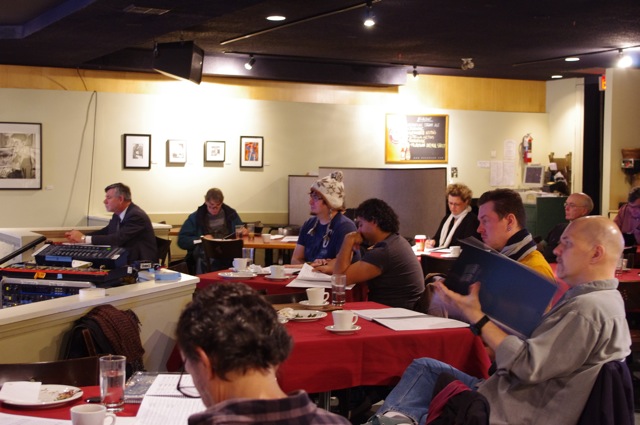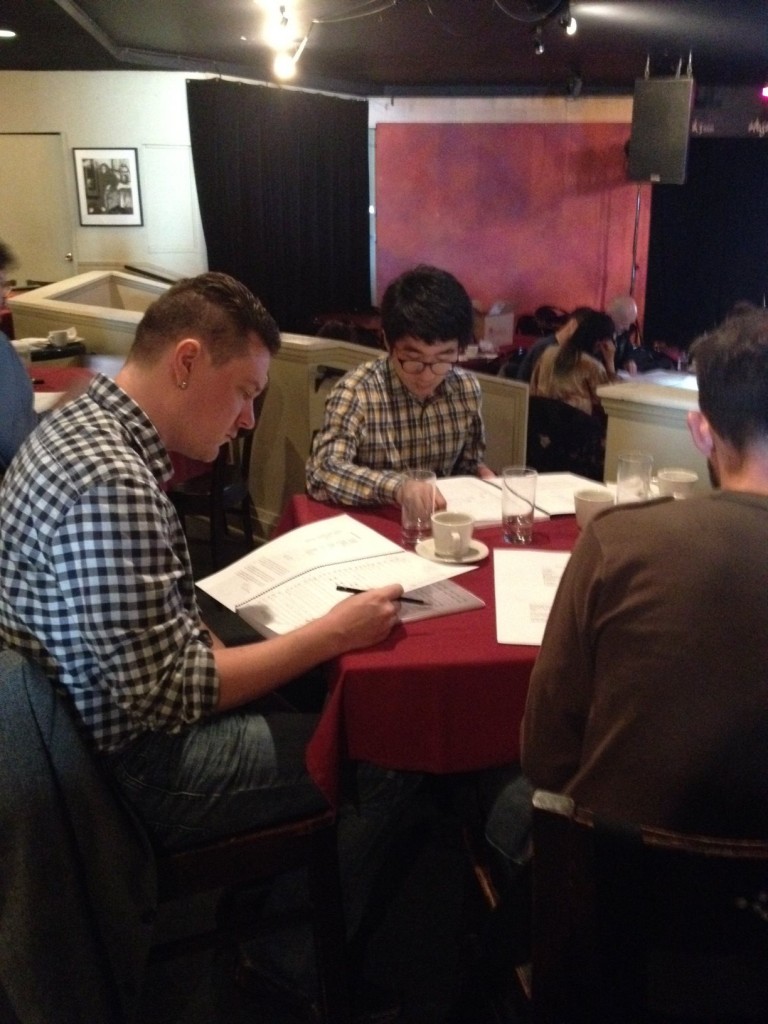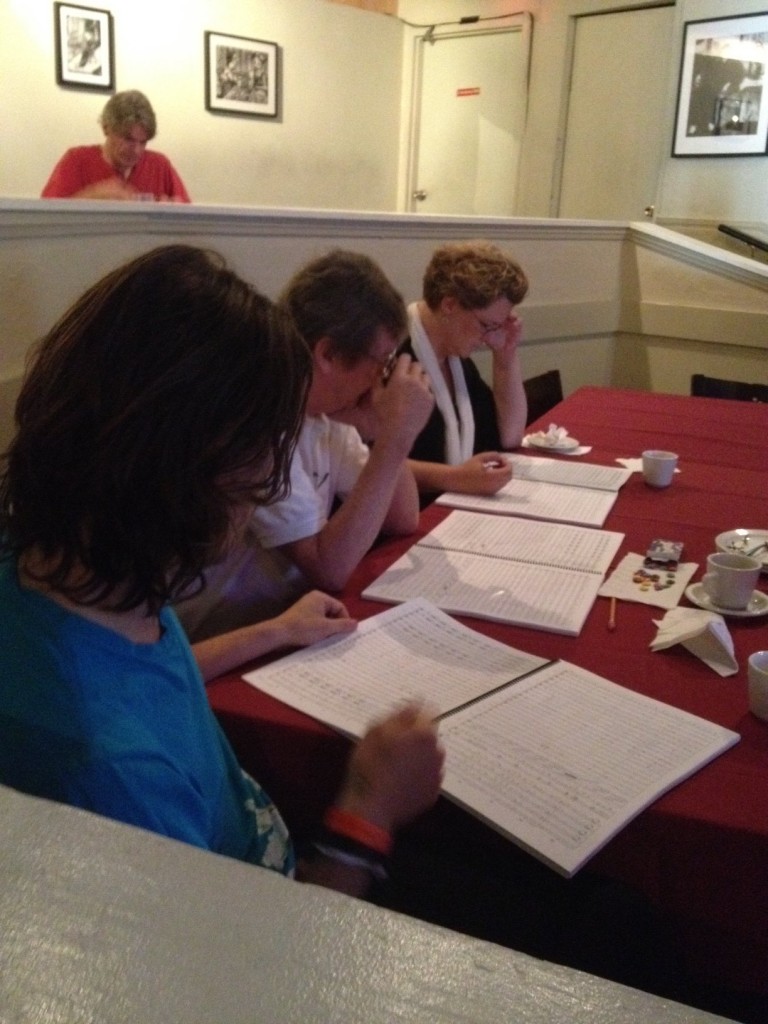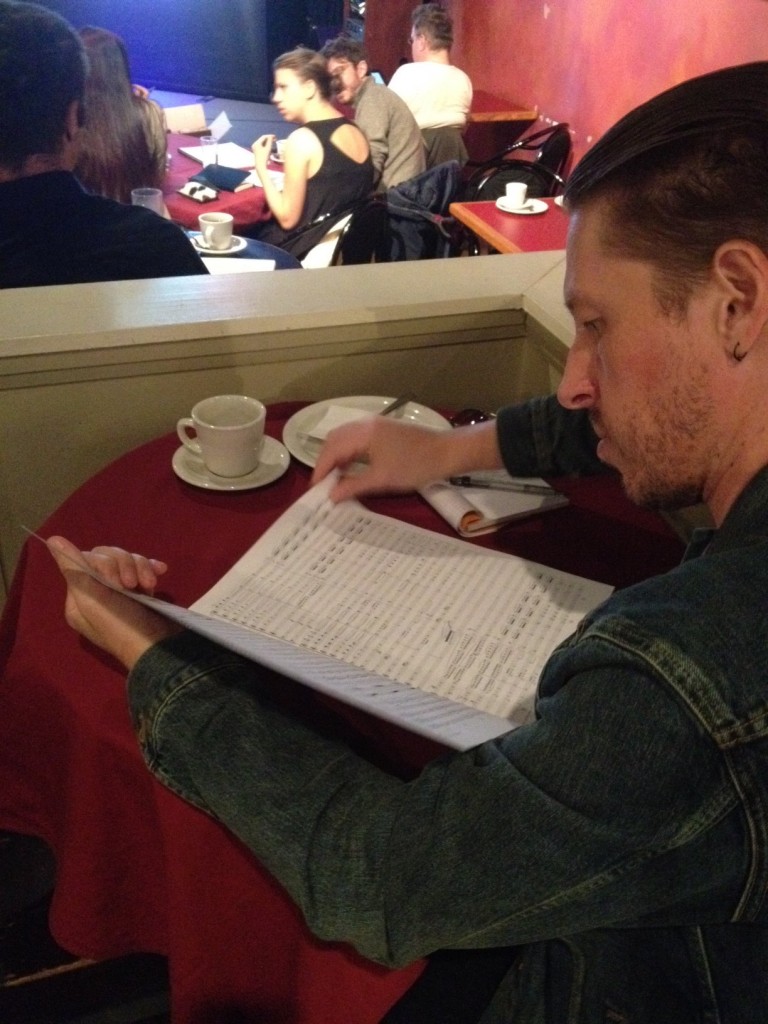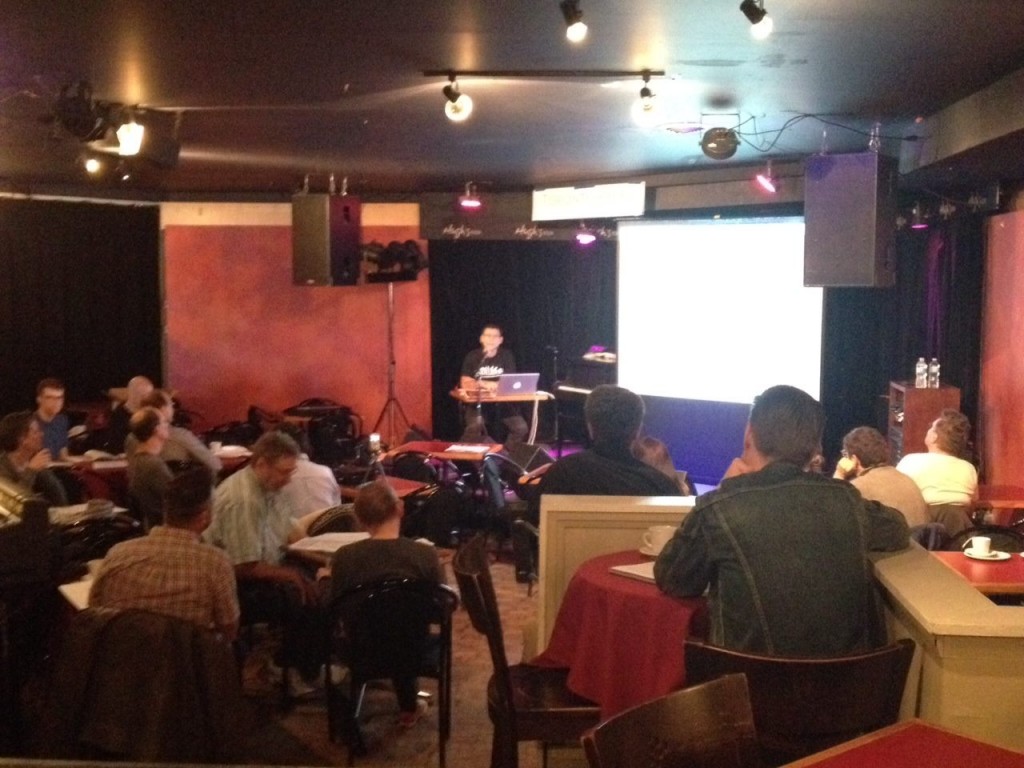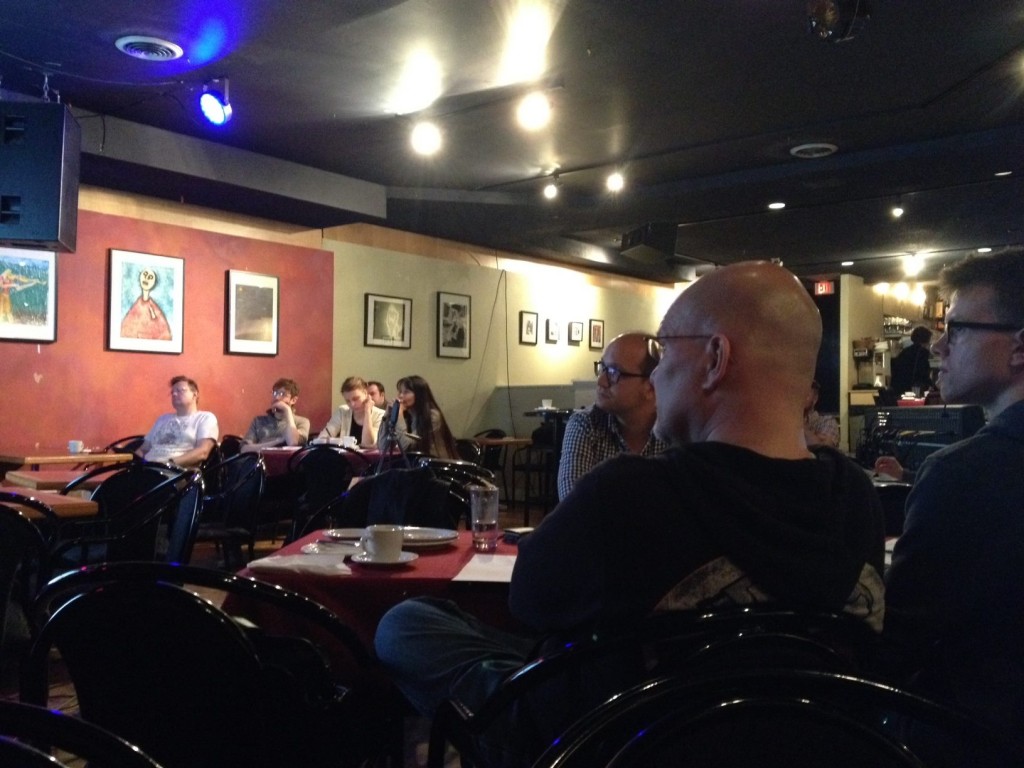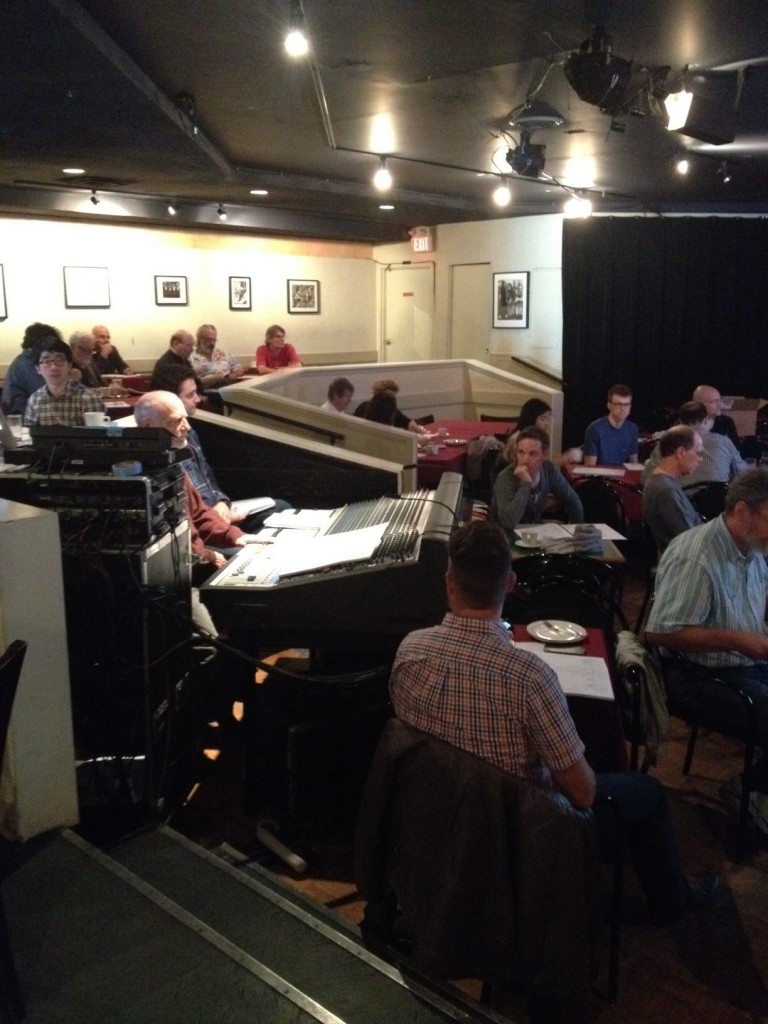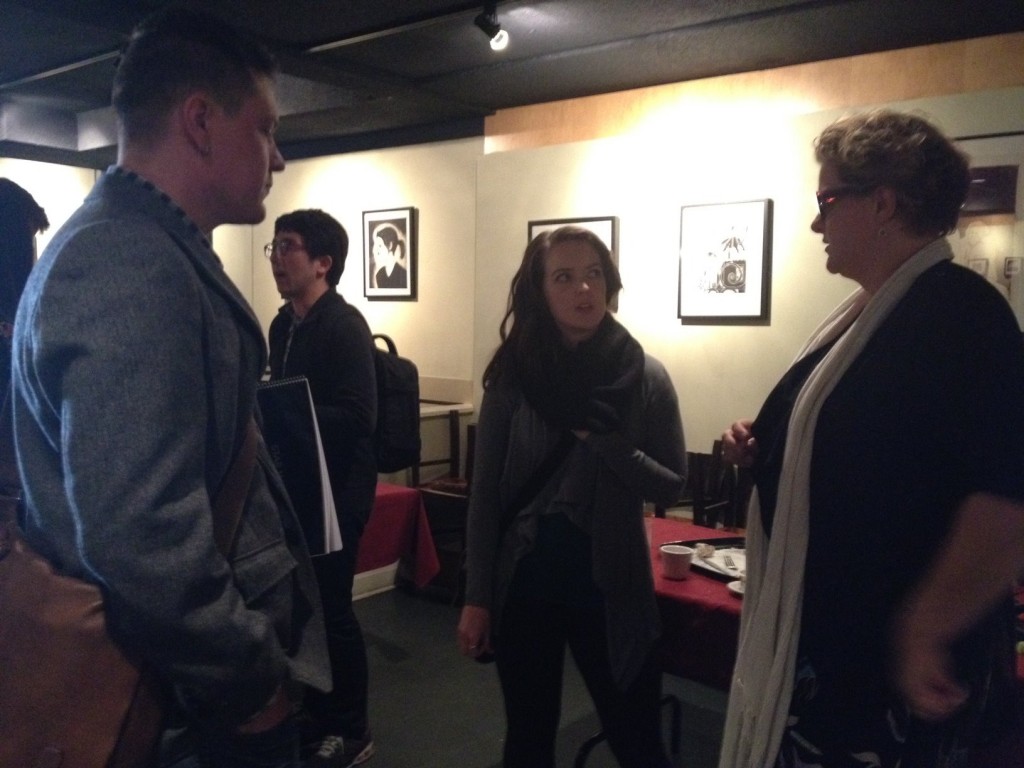[Last update: december 23, 2014.]
My inner curmudgeon was pleasantly affirmed by Michael Vincent’s November 27th post on Composer insults. Nice to know that those demigods who have created the sounds that express our highest aspirations, tender sensitivities, and most profound perceptions are capable of being petty, envious, competitive and begrudging. Yet for me, there was a simultaneous dissonance (pun intended) because of attending a recent monthly gathering of Toronto composers called The Toronto Ravel.
Each time they meet, this group of professional and amateur musicians, composers, film scorers and music enthusiasts begin with an event called Adventures in Listening. Any composer who wishes can submit an anonymous work in progress for critique. Once the piece has been played and appraised, the composer can reveal his or her identity or remain undercover. At the last meeting I attended, we watched a short cartoon with its score, which tracked a winsome stick figure evolving through time, from Stone Age to hyper-technological, and heard the sounds that conveyed the progression. To this amateur, non-composer, the effect was charming, and judging from the comments from the rest of the group, the composer was hitting the musical mark. The comments were constructive, thoughtful, and pointed to compositional and technical options that would have given the scorer some directions to consider. This may be why the composer did in fact chose to indicate who he was. The overall feeling was one of gratitude for the appraisal and appreciation from his peers; truly a model communal moment.
Such communal exchange plus an opportunity to go “deep inside a great composition” is the purpose of The Toronto Ravel, which in turn is the spin-off of the original group, The Los Angeles Ravel, established by Family Guy TV composer Ron Jones. The Toronto founder, composer, film scorer, arranger, orchestration teacher and musician John Herberman, recently explained to me that the man who is at the “top of the pyramid as far a TV composers go”, felt that the isolation of composers, who had worked in groups before computerization, was absurd. He asked a few fellow musicians to get together to study Daphnis and Chloe, and 40 people showed up. Herberman had the same result here in Toronto. “At our first meeting there were 50 people in the room, acting like excited little children. There is a huge hunger to get back to why we got into this in the first place.” The spin-offs in New York, Chicago, Tokyo, and Seattle attest to this appetite for communal contact.
The majority of time at a Toronto Ravel meeting, which happens at Hugh’s Room, is spent studying a score, which is projected on a screen, and played and paused in sections while listeners look at their own copies. (The technology allows different instrument lines to be isolated as well.) After several meetings studying Daphnis & Chloe, the group has moved on to John Williams’ Star Wars Suite. While the participants are almost exclusively professional musicians, composers and film scorers, the Toronto Ravel is open to the public, and according to Herberman, offers different but equally valuable things to professionals and amateurs alike. For the composers, they can examine a great orchestral score so carefully that they start to understand how the creator achieved his or her goal. For an amateur, the analysis of the score allows for more insight into the depth of a composition that might not have been apparent before. He likens the experience to taking a tour of an art gallery with a skilled docent. “When I look at pictures I’m not concerned with brush strokes or other techniques because I’m not going to try to paint myself. But I need to have my perception of what there is to see in the picture enhanced. A good docent can do that for me while other artists study finer details. We’re trying to provide a tour of great compositions to hear more and understand more about what the music contains.”
The third part of the get together is a presentation by a guest speaker. I’ve attended twice, in order to hear University of Toronto Faculty of Music prof Lee Bartel talk about music and the brain. The news is good—strides are being made using sound therapeutically, and maladies such as depression, fibromyalgia and Parkinson’s may be relieved with sound in the future.
As an adult amateur pianist who returned to playing after a 40-year pause (or as I like to think of it now, a long musical rest in both senses of the word), The Toronto Ravel is a chance to experience total immersion in the language of music. Being around folks who ‘speak’ music as their first language is an exhilarating learning curve. It’s true that I don’t understand it all but it’s exciting to increase my fluency. It’s fascinating to hear a trombonist explain why a particular two note progression can only scored a certain way or for Herberman to pause the study to enquire if “there is a harpist in the house”, (which there was). For the passionate amateur, the paradox of music is that it is simultaneously easy to experience and difficult to truly understand. The Toronto Ravel offers a chance to appreciate and increase understanding while observing the musical world as part of the group instead of part of the audience. And the musicians and composers I’ve chatted with have answered my questions with enthusiasm and respect. It makes me feel like I am a musician, which is how all human beings should feel.
The next Toronto Ravel takes place 10 a.m. 13 January 2015, at Hugh’s Room (2261 Dundas St. West) Details here. ($15).

